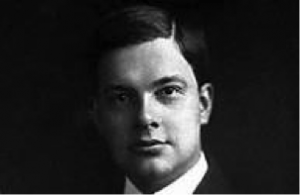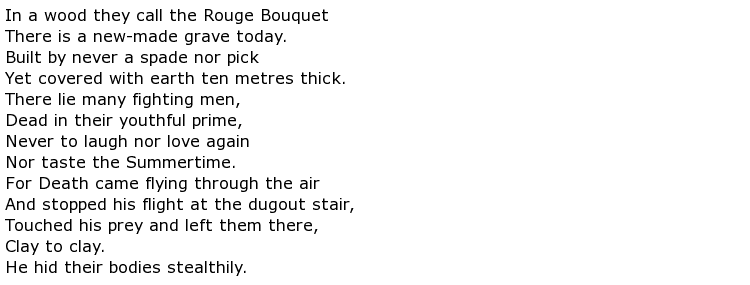 Joyce Kilmer was born on 6 December 1886 and was christened Alfred Joyce Kilmer but he chose to shorten it when he became a published writer. Growing up in New Brunswick, New Jersey Kilmer enjoyed a comfortable, middle class existence. His father was an analytical chemist working for the big company Johnson and Johnson and it was his invention of a new baby powder that went on to be sold worldwide and is still, of course, a popular product today.
Joyce Kilmer was born on 6 December 1886 and was christened Alfred Joyce Kilmer but he chose to shorten it when he became a published writer. Growing up in New Brunswick, New Jersey Kilmer enjoyed a comfortable, middle class existence. His father was an analytical chemist working for the big company Johnson and Johnson and it was his invention of a new baby powder that went on to be sold worldwide and is still, of course, a popular product today.
A gifted boy at Rutgers College Grammar School he won prizes for public speaking, edited the school paper and won a scholarship to Rutgers College where he continued in the same vein. He was very much an accomplished writer but he struggled with mathematics and this was a key element of the curriculum that he really needed to master. His mother encouraged a transfer to Columbia University in New York City. He did well here, graduating with a Bachelor of Arts degree in 1908 and, shortly after he got married. His wife Aline was a fellow poet and she bore him five children.
Kilmer was a prolific journalist, as had been evident right from school days, but he loved writing poetry more than anything else. His writings reflected his strong religious faith and were mostly acute observations of beautiful findings in the natural world. This style took a different course though when, like many young men of his generation, he became interested in the war that was raging across Europe and beyond.
He enlisted into the Army in 1917, seeing service with an infantry regiment. His background and education were well suited for a commission but he preferred to remain in the ranks, and rose to the rank of Sergeant. It was his intention to write an account, in book form, of his experiences but the book never got written. He did, however, continue to write poetry and one of his published pieces was Rouge Bouquet, a tribute to men of his regiment who were killed in a heavy artillery bombardment in northern France. It is a melancholy description of what happens when death rains down on soldiers, and they become instantly entombed, for ever:

His transfer to an Intelligence section pleased him greatly but, tragically, was to lead to his death. He seemed to have a burning desire to put himself into the most dangerous situations. He was a fearless and popular soldier, loved by his comrades, and it was said of him:

It was during the fiercely fought Second Battle of Marne, towards the end of July 1918, that Kilmer met his end. When he was found, apparently taking cover from enemy machine gun fire protected by a small hill, his men called to him. On receiving no reply they went to him only to find him quite dead. A bullet, probably from a sniper, had entered his brain and ended his life at the age of 31. For his bravery he was awarded, posthumously, the fabled Croix de Guerre (Cross of War) by the French Republic.

